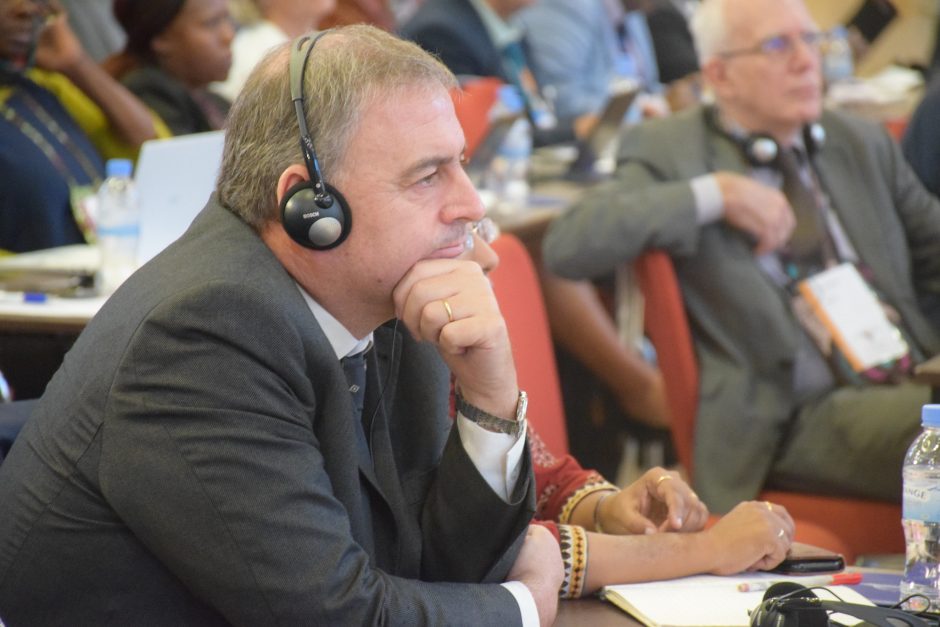Global cooperative movement pledges to promote positive peace
The ICA General Assembly has adopted a declaration in which it reiterates its commitment to “peace, wellbeing and prosperity for all”.
The resolution explains the concept of positive peace, which, according to peace scholar Johan Galtung, is related to the good contributions in the community, particularly cooperation and integration, reconciliation and equality. Positive peace needs to be differentiated from negative peace, which relates to the absence of violence.
Submitted by the ICA board, the resolution calls on the movement to uphold and deepen its commitment to positive peace and call on all of their members to strengthen their action to build positive peace based on the ICA’s Agenda of Cooperative Action for Positive Peace.
The ICA has been committed to peace from its inception and has expressed its position through a number of resolutions, beginning with the 1901 ICA Resolution on Peace adopted at the Manchester Congress.
“The cooperative movement, with its cooperatives, cooperators, support and representative organizations, beyond creeds and political traditions, has sustained since its origins its commitment to positive peace, as the goal and means to build a society founded on the values of democracy, equality, solidarity, participation and concern for the community,” says the resolution.
“Conflicts derive from unmet human needs and aspirations, whereas cooperatives have the mission to respond to human needs and aspirations, including aspirations for a better future, more inclusive, more sustainable, more participative and more prosperous for all.”

ICA looks at developing accounting standards for cooperatives
The ICA General Assembly adopted a motion to develop accounting standards for cooperatives.
Submitted by Co-operatives UK and seconded by Kooperationen in Denmark, the motion calls upon the ICA to engage with members and experts to explore the case, costs and benefits, for the potential development over time of a cooperative statement of recommended practices. Such a standard would permit cooperatives to focus their reporting on their performance in line with cooperative values and principles.
Ed Mayo, Secretary-General of Cooperatives UK said: “There has been a race towards global accounting standards in recent years, but with a single-minded focus on shareholder firms and the needs of their investors.
“Two challenges co-operatives increasingly face in the process are around accounting for member capital and co-op dividend. The first risks making co-ops appear far more fragile than they are, as member equity may be treated as a liability. The second treats member dividends as an expense, i.e. a reduction in sales rather than a distribution of profit.”
The motion recognises the importance of the ongoing work of the Audit and Risk Committee of the ICA (IARAC), and of The Centre of Excellence in Accounting and Reporting for Cooperatives at the University of St Mary’s in Halifax, Nova Scotia, Canada.
Mr Mayo added: “While this is a technical field, the resolution is a permission slip to explore the case for appropriate guidelines or possibly even a new framework for co-operatives (a Statement of Recommended Practice, or SORP) at the international level. This work owes a huge debt to the efforts of Professor Daphne Rixon of the University of St Mary’s in Canada and Dr Maureen McCulloch, of Oxford Brookes University and an Associate of Co-operatives UK.
“It will take time and consultation to explore this further and any work will need to take into account the needs of co-operatives and mutuals across countries and in all their diversity. Most accounting, such as the valuation of assets, is perfectly appropriate. We need to focus on the specific areas of accounting where the member-owned model needs a different interpretation.
“We need a financial language that allows us to express our performance as co-operatives. Otherwise it is like being asked to write poetry in a language that you do not speak.”

ICA GA approves guidelines for a new strategic document
With the Blueprint for a Cooperative Decade coming to an end in 2020, the global cooperative movement adopted the guidelines for a new strategic document to lead cooperatives into the next decade.
The strategic plan examines ICA’s Purpose and Mission in the face of the challenges facing the world, while looking at how to strengthen the Cooperative Identity in this new decade. It also acknowledges the 2020 vision as set out in the Blueprint for a Cooperative Decade and proposes to extend it to 2030.
The strategy focuses on four key themes: promotion of cooperative identity, growth of the cooperative movement, cooperation among cooperatives and contribution to sustainable development, all of which expand on the five pillars of the Blueprint for a Cooperative Decade.
Members of the Assembly also made suggestions on how to enhance the document, which is currently being finalized.

Reports from President and Director General
2019 has been a year full of activity for the ICA. President Ariel Guarco reported visiting 100 members in 40 countries from all over the world since he assumed the Presidency while also engaging with international organisations such as UN bodies.
Over the course of the year the ICA has worked on coordinating with regions and sectors and established a working group among members to better coordinate with regions and sectors. Other events included signing the ICA-ILO MoU and celebrating the International Day of Cooperatives at the United Nations. In a major win, the movement was able to ensure the ILO’s Centenary Declaration on the future of work included a reference to cooperatives. Through the ICA the movement was also represented at the EU Policy Forum on Development.
Mr Guarco said: “The complexity of the social, economic and political conflicts asks us to express our view and show publicly to governments as well as communities that the cooperative model offers real answers generates job and contributes to social peace.”
Youth resolution adopted in Kigali
At its General Assembly, the International Co-operative Alliance adopted a resolution from its Youth Network, asking the ICA board to review the bylaws, articles and budget regarding youth.
The resolution calls for the inclusion, with voting rights, of a youth representative on the boards of the ICA regions. The Africa and Americas regions already have youth representation on their boards. It also suggests including the youth action plan in the ICA global strategy, with an allocated budget.
“Young people are ready for action and looking for support and guidance to best channel their energies,” reads the resolution.
The network also recommends support for youth representatives so they can attend international ICA events, as well as a yearly in-person meetings of the youth committee. Technology can also make the Youth Network more accessible, adds the resolution, which calls for more inclusive tools and bylaws to foster the wider youth participation.
The Youth Network was set up in 2003 to help young co-operators from different countries to share experiences and engage with the rest of the movement.